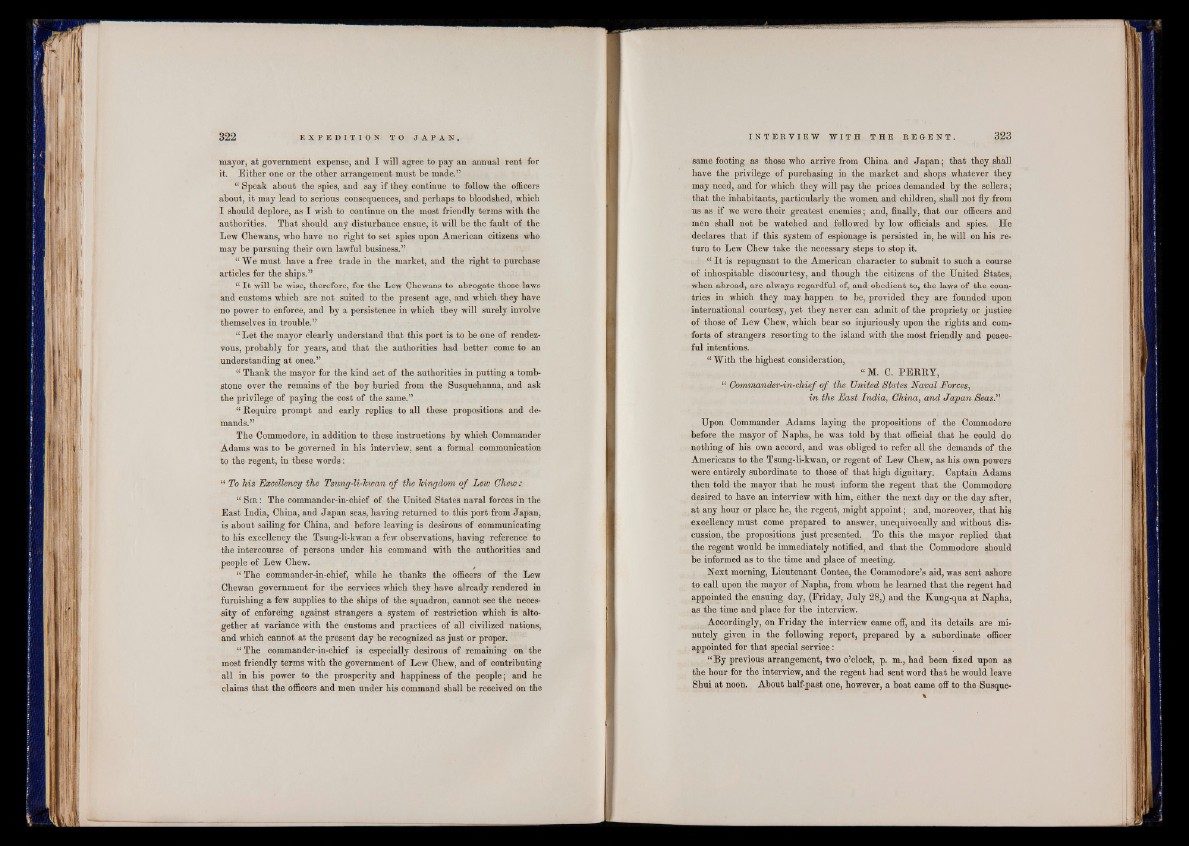
mayor, at government expense, and I will agree to pay an annnal rent for
it. Either one or the other arrangement must be made.”
“ Speak about the spies, and say if they continue to follow the officers
about, it may lead to serious consequences, and perhaps to bloodshed, which
I should deplore, as I wish to continue on the most friendly terms with the
authorities. That should any disturbance ensue, it will be the fault of the
Lew Chewans, who have no right to set spies upon American citizens who
may be pursuing their own lawful business.”
“ We must have a free trade in the market, and the right to purchase
articles for the ships.”
“ I t will be wise, therefore, for the Lew Chewans to abrogate those laws
and customs which are not suited to the present age, and which they have
no power to enforce, and by a persistence in which they will surely involve
themselves in trouble.”
“ Let the mayor clearly understand that this port is to be one of rendezvous,
probably for years, and that the authorities had better come to an
understanding at once.”
“ Thank the mayor for the kind act of the authorities in putting a tombstone
over the remains of the boy buried from the Susquehanna, and ask
the privilege of paying the cost of the same.”
“ Require prompt and early replies to all these propositions and demands.”
The Commodore, in addition to these instructions by which Commander
Adams was to be governed in his interview, sent a formal communication
to the regent, in these words:
“ To his Excellency the Tsung-li-kwan of the kingdom o f Lew Chew:
“ Sir : The commander-in-chief of the United States naval forces in the
East India, China, and Japan seas, having returned to this port from Japan,
is about sailing for China, and before leaving is desirous of communicating
to his excellency the Tsung-li-kwan a few observations, having reference to
the intercourse of persons under his command with the authorities and
people of Lew Chew.
“ The commander-in-chief, while he thanks the officers of the Lew
Chewan government for the services which they have already rendered in
furnishing a few supplies to the ships of the squadron, cannot see the necessity
of enforcing against strangers a system of restriction which is altogether
at variance with the customs and practices of all civilized nations,
and which cannot at the present day be recognized as just or proper.
“ The commander-in-chief is especially desirous of remaining on the
most friendly terms with the government of Lew Chew, and of contributing
all in his power to the prosperity and happiness of the people; and he
claims that the officers and men under his command shall be received on the
same footing as those who arrive from China and Japan; that they shall
have the privilege of purchasing in the market and shops whatever they
may need, and for which they will pay the prices demanded by the sellers;
that the inhabitants, particularly the women and children, shall not fly from
us as if we were their greatest enemies; and, finally, that our officers and
men shall not be watched and followed by low officials and spies. He
declares that if this system of espionage is persisted in, he will on his return
to Lew Chew take the necessary steps to stop it.
“ I t is repugnant to the American character to submit to such a course
of inhospitable discourtesy, and though the citizens of the United States,
when abroad, are always regardful of, and obedient to, the laws of the countries
in which they may happen to be, provided they are founded upon
international courtesy, yet they never can admit of the propriety or justice
of those of Lew Chew, which bear so injuriously upon the rights and comforts
of strangers resorting to the island with the most friendly and peaceful
intentions.
“ With the highest consideration,
“ M. C. PERRY,
“ Commander-in-chief of the United States Naval Forces,
in the East India, China, and Japan Seas."
Upon Commander Adams laying the propositions of the Commodore
before the mayor of Napha, he was told by that official that he could do
nothing of his own accord, and was obliged to refer all the demands of the
Americans to the Tsung-li-kwan, or regent of Lew Chew, as his own powers
were entirely subordinate to those of that high dignitary. Captain Adams
then told the mayor that he must inform the regent that the Commodore
desired to have an interview with him, either the next day or the day after,
at any hour or place he, the regent, might appoint; and, moreover, that his
excellency must come prepared to answer, unequivocally and without discussion,
the propositions just presented. To this the mayor replied that
the regent would be immediately notified, and that the Commodore should
be informed as to the time and place of meeting.
Next morning, Lieutenant Contee, the Commodore’s aid, was sent ashore
to call upon the mayor of Napha, from whom he learned that the regent had
appointed the ensuing day, (Friday, July 28,) and the Kung-qua at Napha,
as the time and place for the interview.
Accordingly, on Friday the interview came off, and its details are minutely
given in the following report, prepared by a subordinate officer
appointed for that special service:
“By previous arrangement, two o’clock, p. m., had been fixed upon as
the hour for the interview, and the regent had sent word that he would leave
Shui at noon. About half-past one, however, a boat came off to the Susque